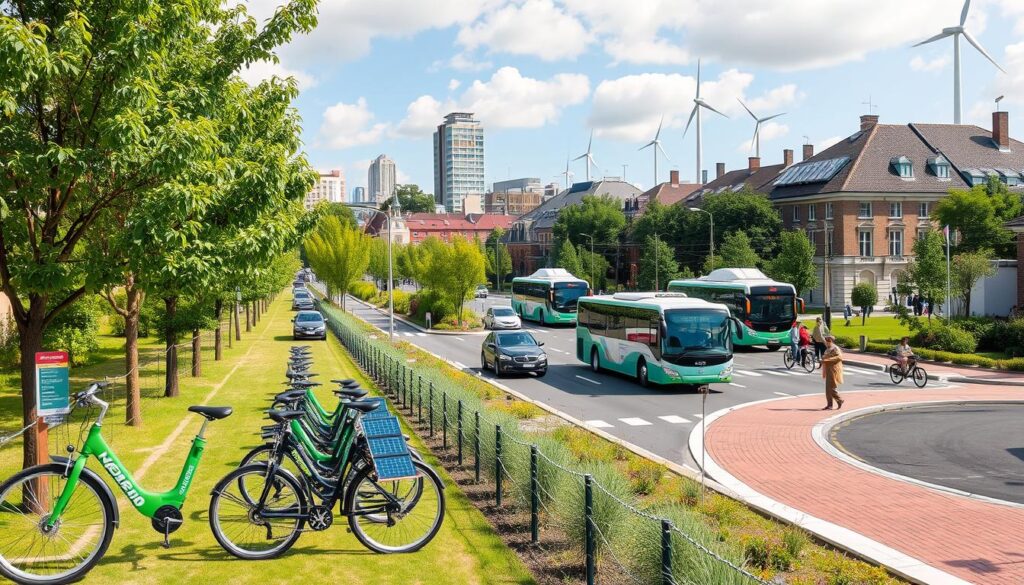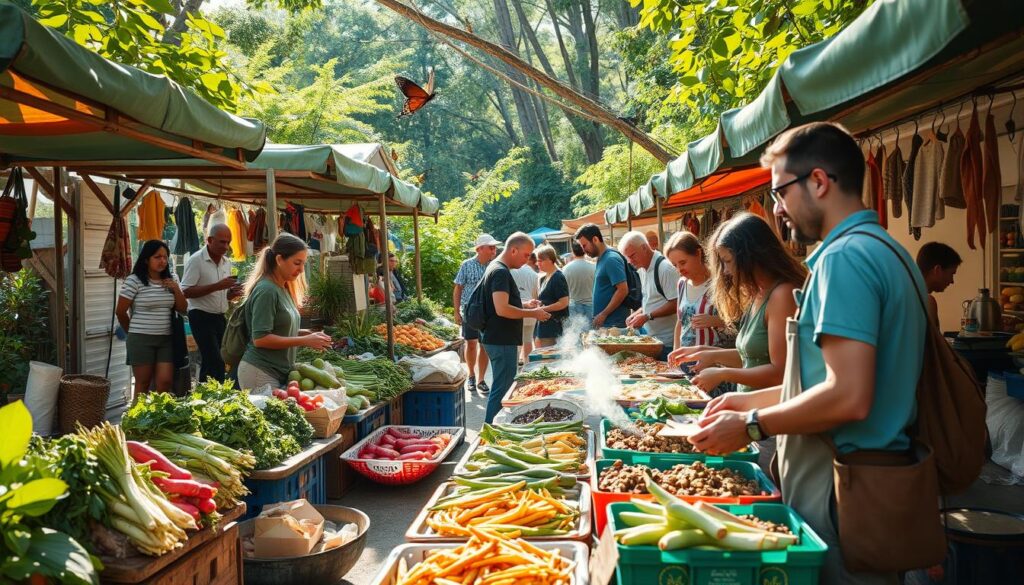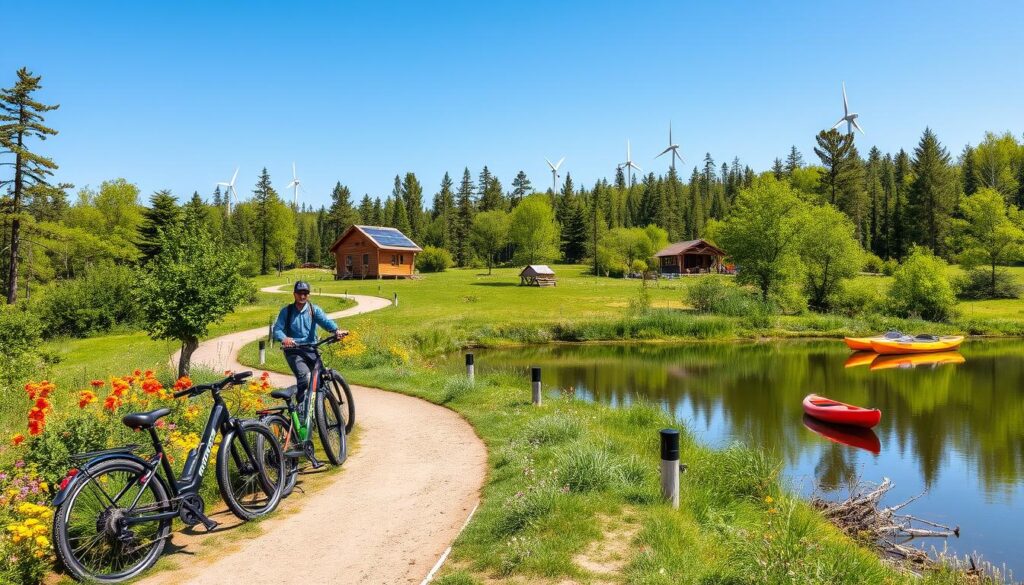היום, טיפול בסביבה חשוב יותר מתמיד. לכן נסיעות ידידותיות לסביבה הן מרכזיות עבור נוסעים אוהבי טבע. זה מפחית את טבעת הפחמן שלנו, מגן על מקומות ותרבויות מהממים. הדרישה לאקו-תיירות גוברת מאחר שאנשים רוצים לטייל באופן אחראי.
בחירת אפשרויות ירוקות יש להן יתרונות רבים. זה עוזר לכלכלות מקומיות ושומר על אקוסיסטמות. כאשר אנו נוסעים בדרך הזו, אנו עוזרים לוודא שהביקורים שלנו לא פוגעים בכדור הארץ.
מסקנות מרכזיות
- נסיעות ירוקות מתמקדות במינימום השפעה סביבתית במהלך הטיולים.
- אפשרויות נסיעה קיימות יכולות לשפר את הכלכלה של הקהילה המקומית.
- אקו-תיירות היא מגמה צומחת בקרב נוסעים מודרניים.
- ביצוע בחירות נסיעה מודעות מועיל לשני הצדדים – הכדור והנוסעים.
- אימוץ של שיטות ידידותיות לסביבה עשוי להוביל לחוויות אותנטיות יותר.
הבנת נסיעות ידידותיות לסביבה וקיימות
נסיעות ידידותיות לסביבה וקיימות מתמקדות בהפחתת השפעתן הסביבתית של הנסיעות. אימוץ
הגדרת נסיעות ידידותיות לסביבה מתכוונת לבחירת שיטות שמסייעות בשמירה ובתיירות אחראית. גישה זו עוזרת להפחתת גלגל הפחמן של נסיעות. זה מאפשר גם לאנשים ליהנות מהטבע ומתרבויות שונות. חשיבותה של נסיעות רבות עם סביבתיות עצומה במאבק נגד שינויי אקלים ובהגנה על אקוסיסטמות.
הגדרה וחשיבות
נסיעות ידידותיות לסביבה כוללות שיטות שמטרתן לגרום פחות נזק לסביבה. זה גם תומך בקהילות מקומיות. למידע על יתרונות נסיעות ירוקות מציג כיצד נוסעים יכולים לנסות באופן אחראי. תיירות בר-תועלת תומכת בשמירה על תרבות ומשפרת את חיי אנשים מקומיים. מחקרים מראים כי בבחירת אפשרויות ידידותיות לסביבה ניתן להפחית באופן משמעותי את פליטות גזי החממה של נסיעות.
השפעה על הסביבה
ההשפעה הסביבתית של נסיעות היא משמעותית. היא מביאה לפליטות גזי חממה נוספות, השמדת מרעה וגירוש זיהום. מחקרים מראים כי שיטות נסיעה מסורתיות נוהגות לגרום לתוצאות שליליות. אלו כוללות יצירת צפיפות תנועה והתרסקות משאבים. השפעות אלו של תיירות עלולות לאיים על חיות ועל אקוסיסטמות. שימוש בשיטות רבות עם סביבתיות עוזר להפחתת השפעות שליליות אלו. זה מעודד תוצאות חיוביות בתיירות רבת עם סביבתיות. זה מרכזי להגן על משאבי האדמה של כדי לדורות הבאים.
| אזור השפעה | השפעות שליליות | פתרונות בר-תוקף |
|---|---|---|
| פליטת פחמן | גידול גזי חממה | שימוש בתחבורה ציבורית או בנסיעה ברכבת |
| השמדת מרעה | אובדן של יעדי חיות וצמחיה | תמיכה ביוזמות לשמירה |
| זיהום | זיהום אוויר ומים | השתתפות במאמצי ניקיון ובסיורים אקולוגיים |
בחירת תחבורה קיימת
בחירת דרכים ידידותיות לסביבה לנסיעה היא מרכזית להגנה על כדור הארץ שלנו. כאשר אנו בוחרים בזהירות איך לנוע, אנו יכולים להפחית בפליטת רעשים מזיקים. אפשרויות כמו תחבורה ציבורית, רכיבה על אופניים, ואף הליכה עוזרות לנו לנסוע בדרך ירוקה יותר.
אפשרויות תחבורה ציבורית
בחירה באוטובוסים, רכבות, או רכבות תחתית במקום רכבים אישיים היא צעד חכם. ערים כמו אמסטרדם וטוקיו הראו שתחבורה ציבורית טובה יכולה להביא לפחות זיהום. על ידי שימוש קבוע בתחבורה ציבורית, כולנו יכולים לעזור להפחית את הנזק הסביבתי.
אמצעי נסיעה ידידותיים לסביבה
רכיבה על אופניים והליכה הם נהדרים לכדור הארץ ולבריאותנו. הם לא מזיקים ועוזרים לשמור על כושר גופנו. עם יותר אנשים שבוחרים ברכיבה על אופניים או ברגליהם, ערים מתקיימות ומתפתחות נקיות ונעימות יותר לחיים.
תפקיד הפיצוי פחמן
פיצוי פחמן הוא דרך לפצות על הזיהום שהנסיעה שלנו גורמת. תמיכה בפרוייקטים ירוקים, כמו נטיעת עצים או אנרגיה נקיה, יכולה לאזן את עקבות הפחמן שלנו. השתתפות במאמצים אלו חשובה ל
מעריצי נסיעות ידידותיות לסביבה.

| אמצעי התחבורה | פליטות (גרם CO2/ק"מ) | יתרונות בריאות |
|---|---|---|
| אוטובוס | 36 | הפחתת מתח, אינטראקציה חברתית |
| רכבת | 14 | רוגע, נופים יפים |
| רכיבה על אופניים | 0 | כושר לבבי, ניהול משקל |
| הליכה | 0 | שיפור במצב רוח, כוח שריר |
בחירות אירוח ידידותיות לסביבה
בחירת מקום לשהות? למטיילים המקפידים על הסביבה יש הרבה אפשרויות. מלונות ירוקים מפחיתים את ההשפעה על הסביבה ומספקים נוחות. מקומות אלה מראים כיצד אירוח יכול לתמוך בנסיעות בר-תועלת.
זיהוי מלונות ירוקים
בחיפוש אחר מלונות ירוקים כדאי לבדוק את אישורי הקיימות שלהם. ארגונים כמו LEED ו-Green Key קובעים את התקנים הללו. הם מתמקדים בחיסכון באנרגיה, טיפול בפסולת ושימוש נמוך במים. Marriott ו-Hilton הם רק חלק מהמלונות שיש להם תעודות כאלו, מבטיחים לאורחים את המחויבות שלהם לכדור הארץ. זה עושה את זה קל יותר למטיילים לבחור מקומות שטובים לכדור הארץ.
אפשרויות אירוח ירוקות ומיוחדות
מחפשים משהו שונה? נסו בבתי עץ, בקתות אקולוגיות או בגלמפינג. הם מציעים שהיות ייחודיות ומראים דאגה לסביבה. מקומות כמו Treehotel בשוודיה ו-EcoCamp Patagonia מציעים יוקרה בלי נזק. אפשרויות Airbnb ידידותיות לסביבה גם עוזרות למשפחות מקומיות ומעודדות תיירות אחראית.
היתרונות של שהיות ירוקים
בחירה ב־מלונות ירוקים משמעותה פגיעה פחותה בסביבה ועזרה לקהילות. מחקרים מראים כי בחירות כאלה מביאות שמחה למטיילים. הם יודעים שהם עושים משהו טוב. נסיעות בר-תועלת תומכות ביצירת עבודה מקומית ובקהילות, ויוצרות השפעה חיובית. זו ניצחון לכל הצדדים המעורבים.

בחירות מתוקנות במהלך הטיול שלך
המטיילים משמשים תפקיד חשוב בתמיכה בקיימות בעת חקירת מקומות חדשים. בחירה במזון מקומי לא רק משפרת את החוויה, אלא גם עוזרת לקהילה. זה מחבר אותנו לתרבויות וכלכלות שונות, ומפגיש את הטיולים שלנו בהשפעה רבה יותר. על ידי בחירת אפשרויות אורגניות, אנו גם מפחיתים את טביעת הרגל הסביבתית שלנו.
אכילה מקומית ואורגנית
אכילה מקומית מאפשרת למטיילים ליהנות מארוחות טריות ועשירות תרבותית עם השפעה סביבתית נמוכה יותר. ניתן למצוא בחירות אורגניות בשווקים מקומיים ובמקומות שמגישים מאכלים מהחקלאות עד השולחן שמציגים את ההרגלים החקלאיים של האזור. זה תומך בגדילה מקומית ומסייע לכלכלה. זה גם מעורר אצלנו מחשבה על המסע של המזון שלנו ועל השפעתו על כדור הארץ.
תיירות חיות בר
בחירת חוויות חיות אתיות היא מרכזית לתיירות חיות בר. עלינו להיות זהירים ביחס לאטרקציות שאנו תומכים בהן, ולהימנע מאלה שמתעללות בחיות. במקום זה, אנו יכולים לתמוך במקומות שמתמקדים בשמירה ובטיפוח של חיות. מוסדות הגנה על חיות שאושרו על ידי קבוצות כמו הגנת חיות העולם מאפשרים לנו ללמוד על חיות בדרך אתית. הם מלמדים אותנו על בתיהן של החיות ועל מה שהן זקוקות לו.

| תרגול | השפעה | המלצות |
|---|---|---|
| אכילה מקומית | תומך בכלכלות מקומיות | בקרו בשווקי החקלאים |
| בחירה במוצרים אורגניים | מפחית חשיפה לחומרים כימיים | חפשו מסעדות אורגניות מוסמכות |
| תיירות חיות פועלת באופן אחראי | מקדם מאמצי שמירה | בקרו במקדשים מוסמכים |
| פגישות אתיות | מבטיחה רווחת חיות | הימנעו מגנים עם הופעות ביצועים |
מסקנה
המסע לנסיעה קיימת הוא מאמץ קבוצתי. זה לא רק על מה שאדם אחד עושה. זה על כולם שמשנים יחד. לדעת כיצד לטייל בצורה ידידותית לסביבה – מאיפה אנו מגיעים ועד לאיפה אנו נשהה – עוזר לנו לבחור טוב יותר. הבחירות הללו עוזרות לנו להשאיר חותם קטן יותר על פני האדמה.
עתיד הנסיעות הידידותיות לסביבה תלוי בהמשך השיח. כאשר הנוסעים יודעים יותר על השפעתם, עולם הנסיעות מגיב. הוא מתחיל להציע בחירות ירוקות יותר. על ידי העמקה במסורות מקומיות, אכילת מזון אורגני ובחירת סיורי חיות חכמה, אנו עושים השפעה ישית. אנו עוזרים לשמור על כדור הארץ שלנו למי שיבוא אחרינו.
כל צעד לעבר נסיעה ירוקה עוצב עתיד שבו הנסיעה תהיה נחמדה לכדור הארץ שלנו. כאשר כולנו בוחרים באפשרויות ירוקות יותר, אנו מתחילים תנועה עוצמתית. תנועה זו מבטיחה שפלאי עולמנו יישארו יפים לצפייה עבור כולם. בכך, להיות ידידותי לסביבה הופך לחלק חיוני בכל המסעות שלנו.

